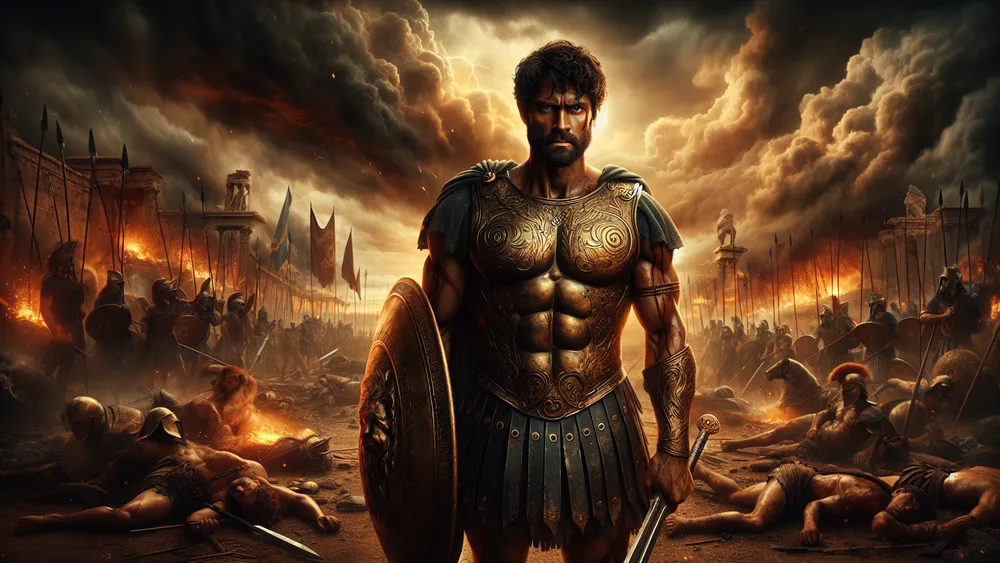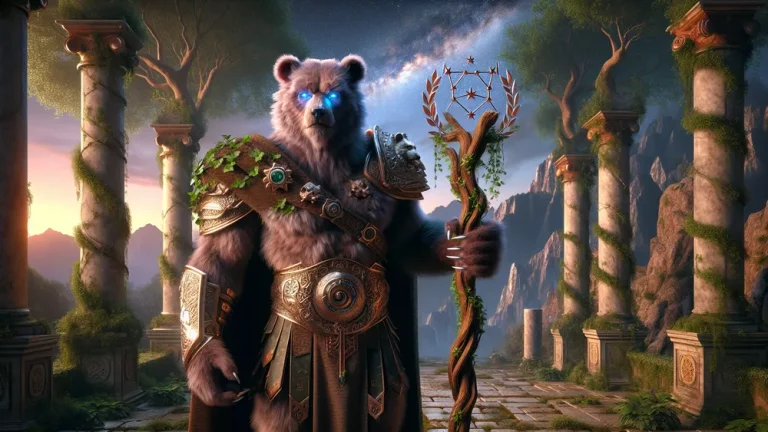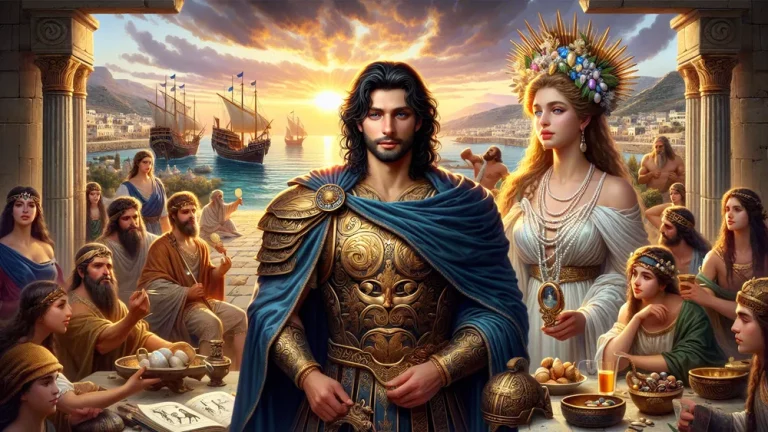Ajax The Great: Greek Mythology Hero Of The Trojan War
In the big mix of Greek stories, Ajax the Great stands out as one of the strongest heroes of the Trojan War. Think of a current military leader. They gain respect and fear on the battlefield, much like a respected team captain who guides the team. Ajax, son of Telamon and Periboea, was known for his big strength, bravery, and strong loyalty to the Greek cause.
Key Points:
- Ajax the Great, also known as Aias, is a hero from Greek mythology, famous for his physical strength and bravery in the Trojan War.
- Born in Salamis, an island in the Saronian Gulf, he is the son of Telamon, the King of Salamis, and Periboea. His lineage is noble, with Zeus as his great-grandfather.
- He played key roles in the Greek army during the Trojan War like leading charges, stopping enemy attacks, and making crucial battle plans.
- His battle with Hector, the Trojan prince, was a notable event. It was an evenly matched duel that ended in a draw, boosting the morale of both armies.
- When Achilles died, Ajax fought for his special armor with Odysseus. The armor was awarded to Odysseus, leading to Ajax’s mental breakdown and eventual death by his own sword.
- Despite his tragic end, Ajax’s legacy is remembered in Greek literature, art, and in various temples where he was worshipped.
- His story is featured in works like Homer’s Iliad, Sophocles’ Ajax, Ovid’s Metamorphoses, and Virgil’s Aeneid.
This post takes us through different parts of Ajax’s life and legacy. From his noble family and young age in Salamis to his key role in the Greek army during the Trojan War. We will look at his duel with Hector. His brave battles and the sad parts of his life too.
We will also talk about how Ajax has been remembered in stories, art, and worship in ancient Greece. Whether you are new to Greek stories or very into them, this full guide gives you more knowledge about Ajax the Great and his lasting impact on Greek culture.
Ajax: Overview and Key Facts
| Key Point | Description |
|---|---|
| Full Name | Ajax the Great (also called Aias) |
| Parentage | Son of Telamon, King of Salamis, and Periboea |
| Ancestry | Grandson of Aeacus, which makes him a great-grandson of Zeus |
| Birthplace | Salamis, an island in the Saronian Gulf |
| Role in Trojan War | One of the main Greek warriors, known for his strength and bravery |
| Famous Duel | Fought Hector, the Trojan prince, in a well-known and evenly matched battle |
| Key Characteristics | Immense physical strength, courage, loyalty, and was very tall |
| Notable Achievements | Defended Greek ships from Trojan attacks, got back Achilles’ body |
| Downfall | Because Athena made him mad, he tragically took his own life |
| Legacy | Remembered in Greek literature, art, and also worshipped in various temples |
Ajax’s Background
To understand the bravery and story of Ajax the Great, we need to look at his beginnings and younger days, which made him become the strong fighter he ended up being.
Ajax’s Family Tree
Ajax the Great came from a well-known family line in Greek stories. His dad Telamon, who was King of Salamis and a great fighter, joined the Argonauts to find the Golden Fleece. This and his bravery definitely shaped Ajax’s early years. His mother, Periboea, added to this noble heritage too. Additionally, his family includes a direct link to Zeus, the king of the gods, through his grandfather Aeacus, who was one of Zeus’s sons. This divine link not only raised Ajax’s status but also gave him a sense of importance and greatness. Let’s look at some of Ajax’s notable ancestors:
- Telamon: King of Salamis and Ajax’s father, who was an Argonaut.
- Periboea: Ajax’s mother, who added to his noble heritage.
- Aeacus: Ajax’s grandfather, Zeus’s son, and a respected judge in the underworld.
- Zeus: Ajax’s great-grandfather and the king of gods, symbolizing divine power.
This notable family line set the stage for Ajax’s life and heroic acts.

Ajax the Great’s family background, including his father’s heroism, his mother’s lineage, and his divine ties to Zeus, significantly influenced his upbringing and heroic deeds.
Ajax’s Early Years
Born on the island of Salamis, Ajax’s early years had a strict upbringing, suitable for a future hero. Like a young athlete getting trained by the top coaches, Ajax from a young age was groomed to be great in fighting and leading. Telamon, his father, made sure Ajax got the best training in battle skills, teaching him values like strength, courage, and honor.
As a child, Ajax joined many physical activities and exercises which built his strong body and combat skills. One important event in his childhood was when he joined games for Heracles, which hinted at his future as a great warrior. This early foundation in Salamis set the stage for Ajax’s later achievements and his important role in the Trojan War.
Ajax in the Trojan War
Since he had a noble family and strict training, Ajax the Great came out as a key figure in the Trojan War, where his bravery and smart planning appeared at the front.
What Ajax Did in the Greek Army
During the Trojan War, Ajax the Great held many important roles in the Greek army that highlighted his importance and courage. Like a powerful leader on the battlefield who is both strong and inspiring, Ajax was one of the main leaders of the Greek forces, known for being second only to Achilles in strength and bravery.
Due to his towering presence and immense physical strength, Ajax was a strong opponent. He was often placed at the front lines to lead charges and stop enemy attacks. Not just a fighter, Ajax was also smart in planning battles, often coming up with plans and tactics crucial to the Greek efforts.
His ability to inspire and lead his men was unmatched, making him central to the Greek military strategy.
To make things clearer, here are some key roles and responsibilities Ajax held in the Greek army:
- Frontline Leader: Led charges and stopped enemy attacks with his immense strength.
- Strategist: Made battle plans and tactics crucial to the Greek efforts.
- Inspiration: Boosted the morale of the Greek troops, inspiring them with his bravery.
- Defender: Played a key role in defending Greek ships and camps from Trojan attacks.
- Duelist: Took part in important one-on-one battles, including his well-known duel with Hector.
These roles highlight Ajax’s many contributions to the Greek army, showing his leadership, strategic mind, and unmatched bravery.
When Ajax Fought Hector
The fight between Ajax and Hector is one of the most memorable moments in the Trojan War, like a championship match with two top fighters. Imagine a high-stakes match where both sides are at their best. The duel began when Hector, the Trojan prince, gave a challenge to any Greek warrior who would fight him. Ajax, famous for his strength and bravery, stepped forward to take the challenge.
They fought hard, exchanging powerful blows and showing their amazing combat skills. It was intense. Neither could get the better of the other. As the sun started to set, heralds from both sides stopped the fight, calling it a draw, and the fighters exchanged gifts as a sign of respect. This duel was important outside the battlefield too.
For Ajax, it proved he was one of the best Greek warriors, able to stand against Hector, who was the best Trojan hero. For Hector, it confirmed he was a strong defender of Troy. The fight also impacted the morale of both armies. The Greeks were inspired by Ajax’s courage and strength, while the Trojans were reassured by Hector’s toughness and skills.
This duel showed the heroic ideas of honor, courage, and respect between worthy opponents, leaving a lasting memory in the story of the Trojan War.
Ajax’s Brave Moments in Battle
During the Trojan War, Ajax the Great showed his bravery and strength in many important battles, like a soldier getting medals for courage. One of his remarkable moments happened during the defense of the Greek ships. When Hector led a fierce attack on the Greek fleet, Ajax stood as a wall against them. Imagine a firefighter stopping a big fire to save a town.
That’s how Ajax’s great strength and unbending courage appeared, stopping the Trojan forces and saving the ships from burning. He held the line and inspired his fellow warriors, which was important for keeping the Greek position.
Here are some significant battles and moments where Ajax’s bravery appeared:
- Defense of the Greek Ships: Stopped Trojan attacks and protected the fleet.
- Battle of the Wall: Fought hard to keep the Greeks’ defenses from being broken by the Trojans.
- Retrieval of Patroclus’ Body: Was very brave when protecting the body of Achilles’ fallen friend, Patroclus, from the Trojans.
- Duel with Hector: Fought in a tough and even duel with Hector, proving his combat skills.
- Night Raid with Diomedes: Joined a risky night raid with Diomedes, showing both his bravery and smart planning.
These moments highlight Ajax’s big contributions to the Greek war effort, proving his unmatched bravery and strength in tough situations.
The Fight Over Achilles’ Armor
When Achilles died, his special armor, made by the god Hephaestus, was wanted by the Greek warriors. Ajax and Odysseus, both respected heroes, were the main ones who wanted it. Ajax talked about his steady bravery and big contributions in battle to say he should get the armor. He pointed out how he defended the Greek ships, fought with Hector, and got Patroclus’ body.
But Odysseus emphasized his clever and strategic thinking, telling about how he planned to bring Achilles into the war, and mentioned many successful missions like the night raid with Diomedes.
In the end, the judges gave the armor to Odysseus because they valued his clever contributions and smart thinking more than Ajax’s strength and heroic actions in fights. This decision hurt Ajax deeply, leading to his eventual tragic end.
The judges awarded Odysseus the special armor over Ajax, valuing his clever strategies and successful missions more than Ajax’s brave battles and heroic feats, which greatly saddened Ajax and eventually led to his tragic fate.
The Downfall of Ajax
When Achilles’ armor was given to Odysseus instead of Ajax, it started a sad change in Ajax’s life. This important moment set things up for his final fall.
When Ajax Lost His Mind
Losing Achilles’ armor to Odysseus was a big blow to Ajax, like an athlete losing a wanted championship. This loss hurt his pride and honor a lot, which led to a bad emotional breakdown. In his pain, Ajax planned to kill the Greek leaders because he thought they wronged him. But the goddess Athena stepped in, making his mind full of delusions.
Because of her, Ajax thought a herd of animals were his enemies and killed them in a wild rage. When he finally came back to his senses and saw what he had done, the shame and humiliation were too much to bear. This was the start of his tragic downfall.

How Ajax Died
Feeling crushed by the shame of what he did, Ajax saw no way to fix his honor. In a moment of deep sadness, he decided to end his life, much like someone who feels trapped by huge emotional pain. Ajax fell on his own sword, a weapon given to him by Hector when they fought, which means the sad end of a once-great warrior.
His death had big effects on the Greek army, as they lost one of their strongest fighters. The Greeks mourned his death, and his burial was a sad event, showing the deep respect and sorrow felt by his comrades.

Legacy of Ajax
Even with his sad end, Ajax’s memory stayed in stories, art, and worship, which showed the lasting effect of his bravery and courage. Through these, people remembered him.
Ajax in Stories and Art
In many stories, Ajax’s bravery and sad end are remembered through Greek literature and art. In Homer’s “Iliad,” he is shown as a tall warrior, second only to Achilles in strength and courage. People can see his duel with Hector and his role in the Greek army, which means his bravery and fighting skills are apparent.
In Sophocles’ “Ajax,” there is a deep look into his mind and his eventual fall, offering a close-up of his character. It’s in Ovid’s “Metamorphoses” and Virgil’s “Aeneid”, too, where his story continues, touching themes of honor, pride, and tragedy. Because of these stories, Ajax has also been a big subject for ancient Greek vase painters and sculptors.
His life scenes, like his fight with Hector and his sad end, have been seen on many vases, showing a visual story of his brave actions and final moments. Statues and reliefs of Ajax were common as well, often showing him in times of intense action or emotion. These pieces of art helped keep his story alive, honoring him and keeping his memory for future generations.
Some important references are:

- Homer’s “Iliad”: Shows Ajax’s bravery.
- Sophocles’ “Ajax”: Explores his mental struggles.
- Ovid’s “Metamorphoses”: Continues his story.
- Virgil’s “Aeneid”: Further mentions of his legacy.
- Ancient Greek Vases: Visual images of key moments.
- Statues and Reliefs: Art showing his bravery and tragic end.
Temples and How People Worshipped Ajax
People in ancient Greece respected Ajax and built many temples for him, especially in his home of Salamis. People worshipped him there. For them, these temples were like the monuments we build today to remember national heroes. The most important temple was the Aianteion in Salamis, where people held ceremonies and festivals to celebrate Ajax’s memory.
During these festivals, called the Aianteia, people took part in athletic competitions, sacrifices, and recited his brave deeds, much like how we today have parades and speeches to honor important people. These activities made sure people remembered Ajax’s bravery and what he did, passing it down to future generations.
In ancient Greece, temples dedicated to Ajax were like modern-day monuments honoring heroes, especially the Aianteion in Salamis, where ceremonies and festivals were held to celebrate his memory and brave deeds, passing down his legacy through athletic competitions, sacrifices, and storytelling.
Famous Greek Mythology Heroes and Figures
Greek mythology is full of a lot of heroes and figures, each with their own unique stories and qualities. They are interesting. If you are curious about these characters, you can look into this list of all the Greek Mythological Heroes and Figures.
This helpful resource has lots of detailed info on a wide array of mythological figures, which gives you a look at their stories and importance.
FAQs
1. Who were Ajax’s parents?
Ajax’s parents were Telamon, the king of Salamis, and Periboea.
2. What was Ajax’s role in the Trojan War?
Ajax’s role in the Trojan War included being a formidable warrior and a key leader in the Greek army, known for his immense strength and bravery in battle.
3. How did Ajax die?
How Ajax died is that he committed suicide by falling on his own sword after losing the contest for Achilles’ armor.
4. What is the legacy of Ajax in Greek mythology?
The legacy of Ajax in Greek mythology is marked by his immense strength, bravery, and tragic downfall, making him a symbol of heroism and human vulnerability.







